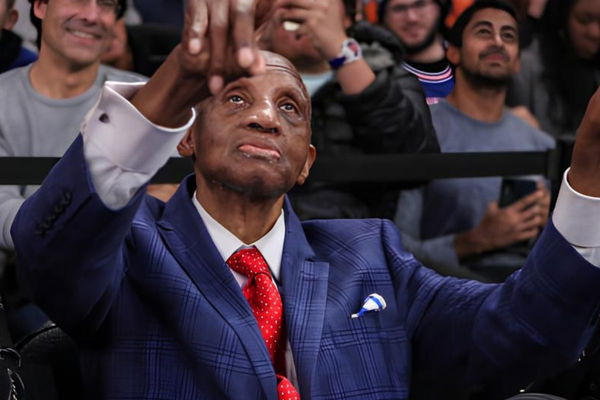
via Imago
Credits: Imagn

via Imago
Credits: Imagn
“He’s got one of the best basketball minds of any player I’ve ever known. Everything he does is for a purpose.” Those powerful words from former New York Knicks General Manager Eddie Donovan perfectly captured what Dick Barnett brought to the game. His passing cast a hush over the NBA—a silent tribute to a champion. The legendary Basketball Hall of Famer and beloved Knicks icon recently passed away in his sleep at the age of 88. As confirmed by his former team on Sunday.
In a heartfelt statement, the Knicks shared, “We are terribly saddened to hear about the passing of Knicks legend Dr. Richard Barnett. Throughout his illustrious career, Dick Barnett embodied everything it meant to be a New York Knick. Both on and off the court. He left a positive impact on everyone he encountered. And this organization is incredibly fortunate to have him be such an integral part of its history.” Hearing such tributes naturally leaves many wondering: what could have been the cause of death?
As of now, officials have not disclosed the cause of death. However, The New York Times reported that Barnett passed away over the weekend while residing at an assisted living facility in Florida. Danielle Naassana, producer of The Dream Whisperer—a PBS documentary highlighting Barnett’s college journey that premiered just last year—shared that although he had become noticeably frail in recent years, there was no indication of any life-threatening illness.
ADVERTISEMENT
Article continues below this ad
View this post on Instagram
Just a year ago, the Naismith Basketball Hall of Fame inducted Barnett under the men’s veterans category. Barnett spent his final nine seasons wearing the Knicks jersey with pride, leaving a legacy that will never be forgotten.
ADVERTISEMENT
Article continues below this ad
A quick recap of Dick Barnett’s NBA career
Barnett’s story begins in Gary, Indiana, where he was born on October 2, 1936. Long before he became an NBA star, he made waves at Tennessee Agricultural and Industrial State University, now called Tennessee State. Between 1957 and 1959, he led the team to an incredible three straight National Association of Intercollegiate Athletics (NAIA) national championships. And here’s a milestone worth celebrating. They were the very first historically black college or university (HBCU) to claim a national basketball title.
Drafted fifth overall by the Syracuse Nationals in 1959, Barnett soon became known for deadly accuracy and steely defense. After two All-Star seasons (1960, 1961), during which he averaged over 16 points per game with the Syracuse Nationals, the team traded Barnett to the Los Angeles Lakers in 1962. There, he maintained a career average of 15.8 ppg, 2.9 rpg, and 2.8 apg over 971 regular-season games.
What’s your perspective on:
Does Dick Barnett's career deserve more recognition in the annals of NBA history?
Have an interesting take?
Barnett found his greatest success after joining the New York Knicks in October 1965. Over nine seasons in New York, he averaged 15.6 points per game, placing ninth on the franchise’s all-time scoring list with 11,429 points. Skull Barnett played a key role in the Knicks’ only two championships. He scored 21 points in the decisive Game 7 of the 1970 Finals and provided veteran leadership in the 1973 title run.
ADVERTISEMENT
Article continues below this ad
And who could forget that signature left-handed shot? Barnett’s famous “Fall back, baby” jump shot — with his legs kicking back as he released the ball — became part of basketball lore. It earned him the nickname “Skull” Barnett. Fittingly, the Knicks retired his No. 12 jersey in 1990, a permanent tribute to his lasting impact.
Beyond the hardwood, Barnett balanced sport with scholarship. He earned a master’s degree from New York University and a doctorate in education from Fordham University. He later taught sports management at St. John’s University, embodying the scholar-athlete ideal through every chapter of his life. And now the NBA legend has left us with nothing but his legacy.
ADVERTISEMENT
ADVERTISEMENT
ADVERTISEMENT
ADVERTISEMENT


Does Dick Barnett's career deserve more recognition in the annals of NBA history?